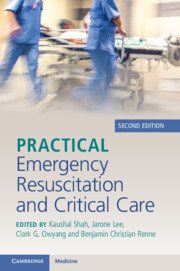Book contents
- Practical Emergency Resuscitation and Critical Care
- Practical Emergency Resuscitation and Critical Care
- Copyright page
- Contents
- Contributors
- Preface
- Section 1 General Critical Care
- Section 2 Infectious Disease Emergencies
- Section 3 Neurological Emergencies
- Section 4 Cardiovascular Emergencies
- Section 5 Respiratory Emergencies
- Section 6 Gastrointestinal Emergencies
- Section 7 Renal Emergencies
- 34 Acid–Base Interpretation
- 35 Common Electrolyte Disorders (Sodium, Potassium, Calcium, Magnesium)
- 36 Acute Kidney Injury and Emergent Dialysis
- Section 8 Hematology–Oncology Emergencies
- Section 9 Endocrine Emergencies
- Section 10 Environmental Emergencies
- Section 11 Trauma
- Section 12 End of Life
- Index
- References
36 - Acute Kidney Injury and Emergent Dialysis
from Section 7 - Renal Emergencies
Published online by Cambridge University Press: 02 November 2023
- Practical Emergency Resuscitation and Critical Care
- Practical Emergency Resuscitation and Critical Care
- Copyright page
- Contents
- Contributors
- Preface
- Section 1 General Critical Care
- Section 2 Infectious Disease Emergencies
- Section 3 Neurological Emergencies
- Section 4 Cardiovascular Emergencies
- Section 5 Respiratory Emergencies
- Section 6 Gastrointestinal Emergencies
- Section 7 Renal Emergencies
- 34 Acid–Base Interpretation
- 35 Common Electrolyte Disorders (Sodium, Potassium, Calcium, Magnesium)
- 36 Acute Kidney Injury and Emergent Dialysis
- Section 8 Hematology–Oncology Emergencies
- Section 9 Endocrine Emergencies
- Section 10 Environmental Emergencies
- Section 11 Trauma
- Section 12 End of Life
- Index
- References
Summary
Acute kidney injury (AKI) is defined as a fall in glomerular filtration rate (GFR) leading to the accumulation of nitrogenous wastes. Two major causes, prerenal azotemia and acute tubular necrosis (ATN), account for nearly 75% of AKI.
- Type
- Chapter
- Information
- Practical Emergency Resuscitation and Critical Care , pp. 365 - 376Publisher: Cambridge University PressPrint publication year: 2023

